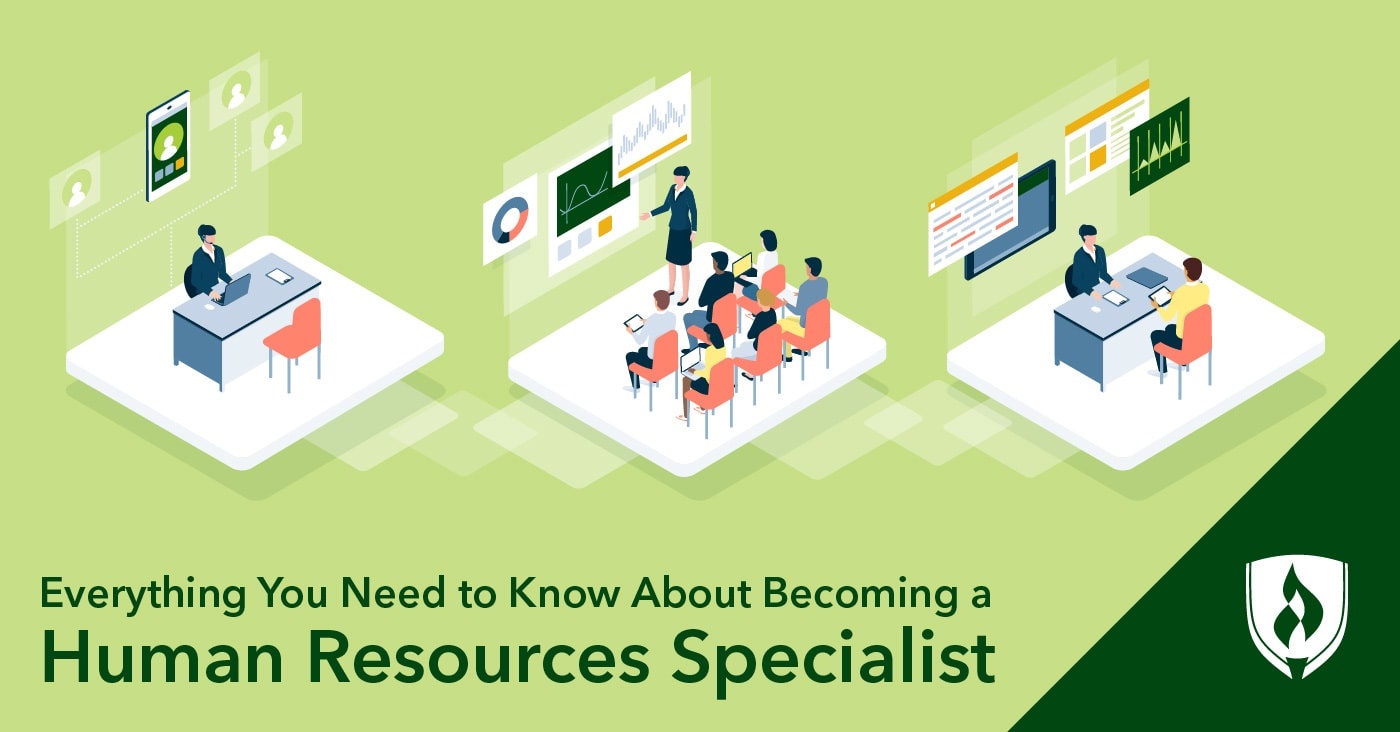Everything You Need to Know About Becoming a Human Resources Specialist
By Brianna Flavin on 10/25/2021

Some people might imagine the world of corporations, large organizations and businesses to be this stiff, sterile place where humanity takes a back seat to raw numbers. But that point of view is oversimplified. Any organization is fundamentally a collection of people—and those people matter.
If you look around an office and see the way individuals shape their companies and the way an organization's success is driven by the choices people within it make, then it’s no wonder you are curious about working in human resources (HR).
One of the most exciting things about the human resources career path is the options it offers for career specialization and advancement. Whether you want to impact the staffing strategy of an entire organization, help employees navigate their benefits or help provide pathways toward professional development, HR specialists can play a role in all of this—and more!
HR is part of every step in an employee’s career journey, from recruiting the right candidate to training, performance appraisal, compensation and exit interviews, according to Rishika Patel, recruitment specialist at HireCream. “To sum it up, HR is an excellent career choice if you want to be the soul of your organization, not just a part of it.”
Why become an HR specialist?
When you invest in a career direction, the last thing you want is to box yourself in. If anything, education and experience should give you more options—not fewer. This is one of the main reasons HR pros love their field.
“The HR function offers various career paths, so I knew that by pursuing it, I would have many career opportunities,” says Sharon Terera, HR research consultant for ForexToStocks. She adds that the opportunity to influence company strategy and major business decisions was another selling point.
HR specialists often have an interesting point of view within the organizations they work for. Because of the very nature of their jobs, HR professionals have a deep perspective on their companies, according to Patel. “Their knowledge of an organization's priorities and challenges allows them to influence the company's future.” This comes through in recruitment and hiring, employee relations, performance management and even benefits and compensation.
What specialties can HR specialists focus on?
The myriad opportunities for specialization in human resources allow you to pursue your primary interests in the field. Whether you choose one during your time in an HR program, pursue specialty certifications or start to tailor your expertise once you start working, there are plenty of ways to make this career your own. Some of the most common HR specialties are:
Training and development
If you’ve ever walked into a job training session, whether that was a dated video in the back room for a retail gig or a weeklong hands-on instruction module, you have an idea of what this specialty does. But onboarding staff is only the beginning.
Few businesses have the luxury of operating the same way year after year. As every company innovates and adapts to the changing world, they need to bring their employees along for the ride. For some industries, like healthcare or construction, companies may need to meet legal requirements as well. These specialists help develop and implement the programs that keep employees up to speed.
Benefits and compensation
Benefits and compensation have a massive impact on gaining a qualified workforce that sticks around. At the end of the day, most people work to provide for themselves and their loved ones. But the local and federal laws around benefits and compensation, plus industry-specific quirks and HR best practices, can make this specialty a real puzzle. These specialists help their organizations strike a balance between costs and employee recruitment and retention needs—something much easier said than done!
Recruitment
Getting the best people for the open roles in your company often means seeking them out. Recruiters combine their organizational awareness with intuitive people skills to find the best possible employees. “I love matching people to the right role and helping businesses achieve their goals with the right staff,” says Jodi Brandstetter, SPHR, SHRM-SCP and CEO of Lean Effective Talent Strategies. She says this area really allows you to problem solve and use your negotiating skills.
HR analytics
If you like digging into data and all the insight it can provide, this HR focus area could be a perfect fit. While the specifics of the work will depend on the organization, HR data analysts are generally trying to suss out trends, forecast or analyze the effects of policy changes and provide important information for the leadership teams of an organization. Terera chose this area because she loves using data to draw insight and design effective HR practices around future trends. “I like investigating why people behave the way they do in the workplace.”
… and many more
These are only the barest tip of the iceberg in HR. The Society for Human Resource Management (SHRM)® lists well over 100 HR disciplines, covering everything from employee wellness to mergers and acquisitions, harassment prevention, and disaster contingency planning. There’s a huge breadth of knowledge and expertise found within this field—and with that comes the ability to carve out an HR career path that fits your interest.
Human resources specialist job outlook
The Bureau of Labor Statistics (BLS) reports that this career has a bright job outlook, with a projected employment growth rate—10 percent—from 2020 through 2030 that’s about as fast as the average for all occupations.1 The BLS points out that more companies will likely expand their HR departments or their connections with HR firms to manage and navigate increasingly complex employment laws and benefit options.1
What skills do human resources specialists need?
Since HR specialists can take on so many roles, the important skills you need for the role will depend on the specific position you’re pursuing—for example, a recruiter often has a similar, but distinct skillset from that of a benefits specialist. That said, the BLS emphasizes that HR specialists largely need communication skills, decision-making skills, strong attention to detail and interpersonal skills.1
“It's very important that HR personnel understand employee needs and problems,” Patel says, emphasizing that employee relations are the backbone of a company. You can only make a good decision when you understand each situation thoroughly.
“An HR professional needs to be a great team player, across all organizational disciplines,” Terera says. Even in analytics, or less employee-facing roles, HR specialists typically work in teams.
“I look for people who understand the company and are interested in learning about all areas of the company,” Brandstetter says. Interest in knowing the company inside and out is important to most HR disciplines.
What does it take to become an HR specialist?
The road to HR varies depending on where you are starting from. Human resources specialists usually need a Bachelor's degree in human resources, business or a related field, according to the BLS.1
A Human Resources Bachelor’s degree program includes courses that will develop a strong foundation for any human resources professional to build upon and branch out from. If you could see yourself getting into this people-centered field, you’ll want to visit the Rasmussen University Human Resources and Organizational Leadership program page to learn more about how this fully online degree program can prepare you for a career in HR.
Related Articles:
1Bureau of Labor Statistics, U.S. Department of Labor, Occupational Outlook Handbook, [accessed September 24, 2021] www.bls.gov/ooh/. Employment conditions in your area may vary.
Society for Human Resources Management (SHRM) is a registered trademark of the Society for Human Resources Management non-profit corporation.




